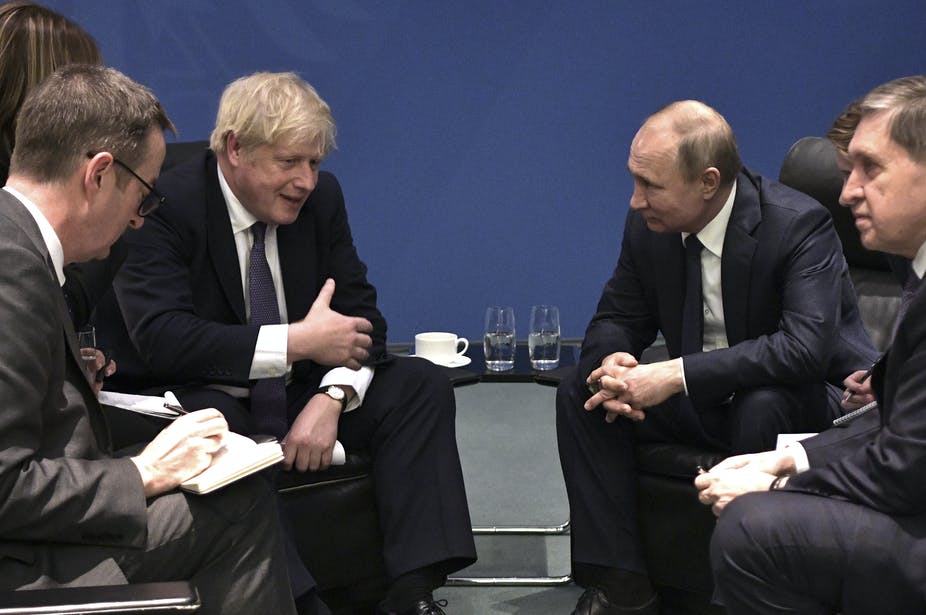The new report from parliament’s Intelligence and Security Committee (ISC) on Russia is damning. The document certainly isn’t a page-turner, and nor does it provide all the answers some had expected. But contrary to most ISC reports, it’s striking and blunt, and the message couldn’t be clearer: Russia’s intelligence agencies pose a direct threat to the UK, but successive governments and the UK agencies have taken their eye off the ball.
The long-awaited report follows an eight-month inquiry by the cross-party committee of MPs, collecting evidence from the UK’s intelligence agencies, senior civil servants and experts. It was published on July 21 after a considerable delay.
As with all ISC reports, not everything is made public. The annexes, containing the written and oral evidence the committee’s conclusions are based on, are redacted to protect sources. As the committee explains, Russia “will analyse whatever we put in the public” domain, potentially undermining UK intelligence capability.
The Russian foreign ministry called the report Russophobia, while the UK government rejected the committee’s calls for a public inquiry into whether or not Russia had interfered in the 2016 EU referendum.
But given months of speculation, what does the report actually tell us?
The Russia threat – and its enablers
As expected, the ISC identifies Russia as a “significant threat … on a number of fronts – from espionage to interference in democratic process, and to serious crime”. The UK’s Government Communications Headquarters (GCHQ) and National Cyber Security Centre told the committee they believe Russia has targeted critical national infrastructure and government departments. In cyberspace, Russia poses an “immediate and urgent threat”, they suggest, while the UK continues to develop its own offensive cyber capability to match that of Russia.
Surprisingly, despite claims of Russian meddling in the Brexit referendum, the ISC’s report says little about it. This is only because the committee was unable to get further information, as claims of Russian meddling were seen as a “hot potato” around government that few wanted to be left with.
Despite “credible open source commentary” of Russian involvement in the 2014 Scottish referendum, the ISC concluded that no organisation held “primary responsibility” for protecting the UK democratic process from “hostile foreign interference”. In a stance branded “illogical” by MPs on the commitee, UK security agencies expressed “extreme caution” two years later over intervening to protect UK democratic processes ahead of the Brexit referendum, fearing being drawn into political issues.
MI5 gave the ISC just six lines of text on the Brexit referendum, instead referring MPs to open source material. The report reveals confusion in Whitehall over responsibility, with the UK’s agencies prioritising “secret intelligence” for departments, suggesting the Electoral Commission and Department for Digital, Culture, Media and Sport were responsible for electoral security – a claim they rejected.
Those wanting definitive proof that Russia meddled in the Brexit campaign will be disappointed by the startling lack of information from the security agencies. What’s clear is that the agencies never asked the right questions. Former ISC chair Dominic Grieve told the BBC: “When the committee came to ask the question – can you tell us there wasn’t interference – we really weren’t able to get an answer.”
Eye off the ball
According to the report, successive UK governments welcomed Russian oligarchs and their money “with open arms” and Russia’s influence on the British establishment is extensive. What is clear is that cold war-style subversion is back, despite MI5’s website still maintaining the threat has “diminished” since the collapse of the Berlin wall.
And yet MPs said the UK’s National Crime Agency (NCA) lacks financial investigators, technical experts and legal expertise to deal with the threat.
The UK’s security agencies – and the government itself – also took their eyes off Russia for too long, despite an assertive Kremlin and the killing of former Russian spy Alexander Litvinenko in London in 2006.
One threat amid many
Still, this criticism needs to be put into the wider security context. During the cold war, the Soviet Union was the main concern and target for the UK’s security agencies. Today, the UK intelligence community, especially MI5, is heavily focused on terrorism.
The UK agencies are faced with a growing list of threats, non-state and state-level, pulling priorities in different directions. In 2008-9, just 3% of MI5’s resources, the report shows, focused on hostile states, a figure rising to just over 14% in 2013-14.
GCHQ devoted around 10% of its resources to Russia as late as 2016, when a “significant further increase” began. To place this in context, during the cold war 70% of GCHQ’s went on the Soviet Bloc. Resources and staff numbers are increasing, especially after the attempted assassination in Salisbury of former Russian spy Sergei Skripal in 2018, but the UK’s agencies are still playing catch-up. And they have a long way to go.
Resources may well increase further following a forthcoming integrated defence, security and foreign policy review. Russia is one of the hardest intelligence challenges that there is, though intelligence resources will also be stretched by China, North Korea and Iran.
The ISC itself was in the process of investigating security issues relating to China, receiving written evidence in April 2019, and questioning intelligence officials in July, although the inquiry was shelved due to the 2019 election.
A key message from the report is that the UK’s agencies will have to push for even more resources if they’re to balance managing the existing terrorist threat while refocusing on traditional state-based ones. The problem now – as the former CIA director James Woolsey once remarked – is that we live in a “jungle filled with a bewildering variety of poisonous snakes”.
Russia is just one of several hostile foreign states inimical to UK national interests. Lessons need to be learnt quickly to ensure the mistakes here aren’t repeated.



 U.S. to Begin Paying UN Dues as Financial Crisis Spurs Push for Reforms
U.S. to Begin Paying UN Dues as Financial Crisis Spurs Push for Reforms  Trump Allegedly Sought Airport, Penn Station Renaming in Exchange for Hudson River Tunnel Funding
Trump Allegedly Sought Airport, Penn Station Renaming in Exchange for Hudson River Tunnel Funding  Nighttime Shelling Causes Serious Damage in Russia’s Belgorod Region Near Ukraine Border
Nighttime Shelling Causes Serious Damage in Russia’s Belgorod Region Near Ukraine Border  Trump Endorses Japan’s Sanae Takaichi Ahead of Crucial Election Amid Market and China Tensions
Trump Endorses Japan’s Sanae Takaichi Ahead of Crucial Election Amid Market and China Tensions  U.S.-India Trade Framework Signals Major Shift in Tariffs, Energy, and Supply Chains
U.S.-India Trade Framework Signals Major Shift in Tariffs, Energy, and Supply Chains  U.S. Lawmakers to Review Unredacted Jeffrey Epstein DOJ Files Starting Monday
U.S. Lawmakers to Review Unredacted Jeffrey Epstein DOJ Files Starting Monday  Norway Opens Corruption Probe Into Former PM and Nobel Committee Chair Thorbjoern Jagland Over Epstein Links
Norway Opens Corruption Probe Into Former PM and Nobel Committee Chair Thorbjoern Jagland Over Epstein Links  India–U.S. Interim Trade Pact Cuts Auto Tariffs but Leaves Tesla Out
India–U.S. Interim Trade Pact Cuts Auto Tariffs but Leaves Tesla Out  Pentagon Ends Military Education Programs With Harvard University
Pentagon Ends Military Education Programs With Harvard University  Missouri Judge Dismisses Lawsuit Challenging Starbucks’ Diversity and Inclusion Policies
Missouri Judge Dismisses Lawsuit Challenging Starbucks’ Diversity and Inclusion Policies  Trump Backs Nexstar–Tegna Merger Amid Shifting U.S. Media Landscape
Trump Backs Nexstar–Tegna Merger Amid Shifting U.S. Media Landscape  Trump Allows Commercial Fishing in Protected New England Waters
Trump Allows Commercial Fishing in Protected New England Waters  New York Legalizes Medical Aid in Dying for Terminally Ill Patients
New York Legalizes Medical Aid in Dying for Terminally Ill Patients  Trump Says “Very Good Talks” Underway on Russia-Ukraine War as Peace Efforts Continue
Trump Says “Very Good Talks” Underway on Russia-Ukraine War as Peace Efforts Continue  China Warns US Arms Sales to Taiwan Could Disrupt Trump’s Planned Visit
China Warns US Arms Sales to Taiwan Could Disrupt Trump’s Planned Visit  Ohio Man Indicted for Alleged Threat Against Vice President JD Vance, Faces Additional Federal Charges
Ohio Man Indicted for Alleged Threat Against Vice President JD Vance, Faces Additional Federal Charges 

































